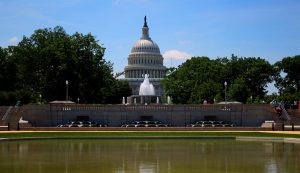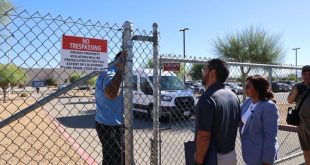 -Editorial
-Editorial
WASHINGTON, D.C. — On July 3, the U.S. House of Representatives passed the “One Big Beautiful Bill Act,” a sweeping legislative package strongly backed by former President Donald Trump. The bill, already approved by the Senate in a narrow vote, now heads to the President’s desk, where Trump is expected to sign it into law in the coming days.
Republican leaders are calling the bill a cornerstone achievement of the Trump administration’s “America First” platform. The legislation includes broad tax cuts, major changes to federal spending, an expansion of fossil fuel production, heightened border enforcement measures, and significant restructuring of several longstanding federal programs.
“We have succeeded in enacting President Trump’s America First agenda, and we did it in record time,” House Republican leadership said in a joint statement following the vote. “This bill lowers taxes, secures the border, restores peace through strength, and makes government more efficient for all Americans.”
The bill’s passage marks a significant political victory for Trump and his allies ahead of the 250th anniversary of American independence and sets the tone for the upcoming general election campaign season.
White House Press Secretary Karoline Leavitt added further praise for the bill. “President Trump’s One Big, Beautiful Bill delivers on the commonsense agenda that nearly 80 million Americans voted for — the largest middle-class tax cut in history, permanent border security, massive military funding, and restoring fiscal sanity,” she said. “These pro-growth policies are going to fuel an economic boom like we’ve never seen before. President Trump looks forward to signing this bill into law to officially usher in the Golden Age of America.”
However, the bill has ignited intense backlash from Democratic lawmakers, governors, advocacy groups, and public health organizations, who argue that the legislation will have devastating consequences for low- and middle-income Americans, particularly in areas of healthcare, education, environmental policy, and food security.
California Governor Gavin Newsom sharply criticized the bill, calling it “a tragedy for the American people, and a complete moral failure.”
“The President and his MAGA enablers are ripping care from cancer patients, meals from children, and money from working families — just to give tax breaks to the ultra-rich,” Newsom said in a statement. “With this measure, Donald J. Trump’s legacy is now forever cemented: he has created a more unequal, more indebted, and more dangerous America. Shame on him.”
According to data cited by Newsom’s office, provisions in the bill include an estimated $28 billion in cuts to Medicaid funding for California alone, elimination of clean energy tax credits that labor unions argue could threaten over 680,000 jobs nationwide, and sharp reductions to FEMA, the FBI, food assistance programs, and wildfire prevention efforts. Other provisions roll back Affordable Care Act subsidies, eliminate student loan protections, impose new restrictions on abortion, and add financial penalties for electric vehicle ownership.
In the healthcare sector, national mental health advocates have also sounded the alarm. The National Alliance on Mental Illness (NAMI) expressed grave concern about the bill’s impact on millions of Americans who rely on public mental health services.
“Despite hearing from constituents for months about the harmful impacts of this bill, Congress has moved forward with cuts that will end access to lifesaving services for many,” said NAMI CEO Daniel H. Gillison, Jr. “This is a devastating blow to mental health care in America.”
Several lawmakers from California and other states with large populations affected by the bill’s provisions voted against the final package. Congressman Dr. Raul Ruiz (D-CA), a practicing physician and representative of California’s 25th District, opposed the bill and highlighted what he called the disproportionate harm it would cause to rural communities.
“This bill is a direct threat to the health and wellbeing of my constituents and rural Americans across the country,” Ruiz said on the House floor. “It could lead to the closure of up to 383 rural hospitals nationwide — including four in my district alone: El Centro Regional Medical Center, Pioneers Memorial, Colorado River Medical Center, and Palo Verde Hospital.”
Ruiz also warned that the legislation would eliminate healthcare coverage for an estimated 17 million Americans, slash funding for food assistance programs, and result in utility rate hikes averaging $400 per year for most U.S. households — with some California families facing increases up to $678 annually.
He added that even with all these cuts, the bill is projected to add nearly $5 trillion to the national deficit, due in part to tax reductions primarily benefiting the wealthiest individuals and corporations.
Fellow California Democrat Juan Vargas was even more blunt in his response to the bill’s passage.
“The House just voted on budget reconciliation — a partisan bill passed by the Republican majority without a single Democratic vote,” Vargas said in a public statement. “Trump and Republicans’ ‘Big Ugly Bill’ is one of the worst pieces of legislation I’ve ever seen, and its impact will be nothing short of devastating.”
Vargas accused the bill of being a “gross transfer of wealth from working families to billionaires,” adding that it guts healthcare for millions of children and families, strips away food assistance from vulnerable communities, and funnels billions into enforcement priorities aligned with mass deportation.
“Even with all these disastrous cuts,” Vargas continued, “the bill still explodes the federal deficit. With this vote, Republicans in Congress have inflicted an unbelievable amount of pain and suffering on millions of families across the country. It’s an absolute betrayal. Shame on them. This won’t be forgotten.”
The bill passed the House largely along party lines, with no Democratic support and only a few Republican dissenters. Political analysts note that the legislation is likely to remain a central issue in upcoming congressional and presidential campaigns, with both parties using its passage to energize their respective bases.
For supporters, the bill represents a long-awaited course correction aimed at downsizing government and promoting economic growth. For opponents, it is a dismantling of critical safety nets and public protections. As President Trump prepares to sign the legislation into law, the nation remains sharply divided — not only by party, but by radically different visions for the future of American governance.


